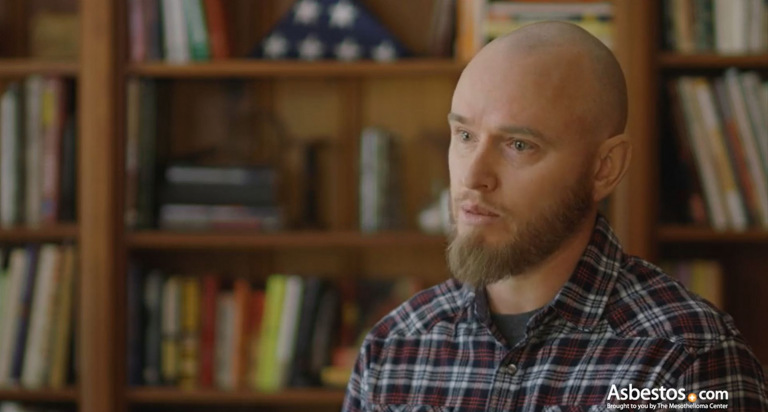
Find out if you qualify to file a VA claim with help from the nation’s most trusted mesothelioma resource.
Get Your Free GuideMany U.S. veterans face a higher risk for mesothelioma because the military used asbestos in buildings, ships, vehicles and gear. Even today, old equipment and structures that contain legacy asbestos products can expose veterans to asbestos during repairs, combat or demolition.

Exclusive Content
Aaron Munz: Why veterans are at a higher risk of developing mesothelioma
"Finally a resource where a veteran can get not only good adv..." see more
Ron L. - Mesothelioma Patient
"If you are a Vet with suspected asbestos exposure, this site..." see more
Britt W. - Mesothelioma Patient
"To all the families of Veterans with this horrible disease, ..." see more
Betty S. - Mesothelioma Patient
"I had a Veteran come in with a positive diagnosis of mesothe..." see more
JG - Mesothelioma Patient
"Thank you for all that you have done to make filing my broth..." see more
Carrie D. - Sibling of a Mesothelioma Patient

Exclusive Content
Aaron Munz: Why veterans are at a higher risk of developing mesothelioma
Veterans develop mesothelioma because they were exposed to asbestos during their military service. The military used asbestos-containing materials, also known as ACMs, in ships, vehicles, buildings and equipment for insulation and fireproofing. Veterans in roles like pipefitting, boiler operation, shipbuilding, mechanical maintenance and ship repair often faced frequent contact with asbestos fibers, which can cause mesothelioma many years later.
Navy veterans have higher risk because ships and shipyards used large amounts of asbestos in insulation and engine rooms. Global studies show people working aboard ships have more than double the chance of developing mesothelioma compared to people without this exposure.
Asbestos use was common across every military branch, and risks remain today. Veterans still face exposure when working on older equipment or in buildings that contain asbestos. This ongoing risk shows why mesothelioma remains a serious concern decades after asbestos use ended.
Roughly 1 in 3 mesothelioma cases are linked to military asbestos exposure. Veterans and civilians on military bases face asbestos exposure risks when they handle or repair older buildings, equipment or asbestos products. Every military occupation carries some risk, but jobs with frequent or close contact to asbestos fibers carry much higher risks. These risks come from tasks like ship maintenance, construction, demolition and firefighting where asbestos products were widely used.
Military Jobs With Higher Asbestos Exposure Risks
These occupations carry significant risk for asbestos exposure. Still, veterans in nearly any military role could face exposure, especially when working with older equipment or during repair and maintenance. Asbestos was so common that routine tasks sometimes released hazardous fibers. Mesothelioma symptoms can take decades to appear after asbestos exposure.
Army Col. Doug T. shared his experience with us. He tells us, “When I was diagnosed with mesothelioma, it made me realize the disproportionate number of veterans who develop cancer compared to their civilian counterparts. Based on the statistics we see now, we need to make sure veterans are being screened for these different problems and are being treated. I know the Army and the VA will do their part for me and will continue to ensure all veterans are taken care of.”

Find out if you qualify to file a VA claim with help from the nation’s most trusted mesothelioma resource.
Get Your Free GuideVeterans with mesothelioma can choose from several effective treatments. Eligible veterans may receive treatment from specialists at VA medical centers at little to no cost. The most common treatments for mesothelioma include surgery, chemotherapy, radiation therapy and immunotherapy. Veterans should see mesothelioma doctors who know how military service relates to this rare cancer.
These veterans may get treatment through the U.S. Department of Veterans Affairs or private health providers. The VA recognizes mesothelioma as a service-connected illness when the majority of a veteran’s asbestos exposure occurred during active duty.
Key Facts About Mesothelioma Care for Veterans
The VA partners with some of the nation’s top mesothelioma specialists, and veterans can receive expert care at VA medical centers. The VA also offers clinical trials, including emerging therapies, designed for veterans.
For many veterans, access to experienced specialists can improve outcomes and quality of life. Understanding your treatment choices also means thinking about the cost of care. VA benefits can help cover expenses and provide financial relief for veterans and their families.

Odell R.
Navy Veteran Says Surgery Improved His Well-Being
Reknowned mesothelioma specialist Dr. Avi Lebenthal performed a 12-hour surgery that removed all visible sign of pleural mesothelioma. A personal call from Lebenthal convinced Odell to have surgery.
Odell R.
Veterans diagnosed with mesothelioma can qualify for several VA benefits. These benefits provide financial support, health care access and extra aid to help with the costs and challenges of mesothelioma.
VA Benefits for Veterans With Mesothelioma
Filing claims for VA benefits can help ease the financial and medical challenges veterans face living with mesothelioma. Veterans and their families can seek available options and get support through the VA.
Mesothelioma care for veterans is provided through the Veterans Health Administration. This is the health-care branch of the VA and offers a wide range of services for veterans with mesothelioma. Veterans must show that at least 50% of their asbestos exposure happened during active duty to qualify. The VA provides standard treatments and specialized care tailored to mesothelioma.
Covered Mesothelioma Care for Veterans
Veterans eligible for VA health care get full coverage for mesothelioma treatment and support. In-home health care helps veterans who need medical care but can’t travel. This clinical service is separate from special monthly compensation, which provides extra financial support for veterans needing help with daily activities at home.
Disability compensation offers monthly, tax-free payments to veterans with service-connected illnesses like mesothelioma. The VA considers mesothelioma a 100% disabling condition because of how serious it is and how it affects daily life.
To receive these benefits, veterans must file a claim and provide proof that their asbestos exposure happened during their service. Once approved, they’ll receive monthly compensation based on their household. As of 2025, single veterans with mesothelioma receive $3,831 each month, while married veterans receive $4,044. These VA compensation rates may increase based on dependents or additional needs.
As an Army veteran myself and director of our Veterans Department, I see many veterans we assist across the nation have already been diagnosed with an asbestos-related disease, and the VA has denied their claims. We work closely with them to identify when and where they came into contact with asbestos, whether during military service or civilian life. Then, we help write an asbestos exposure summary describing their asbestos exposure history and the lack of protective equipment available at the time.

We can help you or a loved one file asbestos-related VA claims and access potential benefits.
Get Help NowVeterans diagnosed with mesothelioma may qualify for VA benefits if their illness is directly linked to asbestos exposure during military service. Eligibility requires meeting clear criteria about service, medical diagnosis and proof of asbestos exposure. These rules ensure benefits reach those whose mesothelioma results from their time in the military.
Many veterans who qualify served in high-risk Navy jobs or worked in shipyards or construction, where asbestos exposure was common. But eligibility depends on more than job type. Veterans need an honorable or general discharge and medical evidence connecting their mesothelioma to military asbestos exposure.
Eligibility Criteria for Veterans Benefits
Veterans who meet these requirements can apply for benefits with help from a VA-accredited claims agent. These agents guide veterans through the claims process, ensuring all documents are submitted correctly and on time. If you are unsure about your eligibility, a mesothelioma specialist or a VA-accredited claims agent can help you understand your options and guide you through your next steps.
The main options for veterans with mesothelioma are VA benefits, asbestos trust fund claims and legal compensation through lawsuits. Veterans don’t sue the military itself. Claims target the companies that supplied asbestos-containing materials to the military. Those companies hold the responsibility for exposing people to asbestos, which can cause diseases like mesothelioma.
Veterans can apply for VA disability compensation and health care. Many also seek compensation from asbestos trust funds to cover current and future needs. Companies that made asbestos products created these funds during bankruptcy to pay claims from people diagnosed with asbestos-related diseases.
Veterans often work with an experienced mesothelioma lawyer who provides expert help filing trust fund claims and lawsuits. A qualified lawyer supports veterans in holding responsible companies accountable and pursuing the compensation they need. Using legal options alongside VA benefits helps veterans maximize their financial support.
Veterans with mesothelioma should take several key steps to protect their health, access treatment and secure the benefits and support they’ve earned through military service. Acting quickly helps maximize treatment options and provides critical physical, emotional and financial help.
Steps for Veterans With Mesothelioma
Our Patient Advocates have worked with veterans since 2006. We help half of all veterans diagnosed with mesothelioma each year, offering personalized support. You can access specialists and dedicated resources for mental health and caregiver needs.
If the majority of a veteran’s lifetime exposure to asbestos occurred on active duty, the VA can approve a mesothelioma diagnosis as a service-connected disability for benefits.
Answered By: Aaron Munz, director of Veterans Department & Former U.S. Army Captain
If the cancer is determined to be service-connected, the disability rating will be 100% as long as the cancer is active and for six months following the final treatment.
Answered By: Aaron Munz, director of Veterans Department & Former U.S. Army Captain
Veterans may qualify for VA Disability Compensation and VA health care if military service caused or worsened their health conditions. Veterans’ families can stay at Fisher House homes while a veteran is in the hospital receiving medical care.
Answered By: Aaron Munz, director of Veterans Department & Former U.S. Army Captain
Stay up-to-date on treatment, research, clinical trials, doctors and survivors
The information on this website is proprietary and protected. It is not a substitute for professional medical advice, diagnosis or treatment. Any unauthorized or illegal use, copying or dissemination will be prosecuted. Please read our privacy policy and terms of service for more information about our website.
This website and its content may be deemed attorney advertising. Prior results do not predict a similar outcome.
The Mesothelioma Center’s claim as the most trusted resource is based on our more than 150 5-star Google and BBB reviews. Our organization also helps more than half of all mesothelioma patients annually diagnosed.
Your web browser is no longer supported by Microsoft. Update your browser for more security, speed and compatibility.
If you are looking for mesothelioma support, please contact our Patient Advocates at (855) 404-4592
Munz, A. (2026, February 10). Mesothelioma & Veterans. Asbestos.com. Retrieved February 10, 2026, from https://www.asbestos.com/veterans/
Munz, Aaron. "Mesothelioma & Veterans." Asbestos.com, 10 Feb 2026, https://www.asbestos.com/veterans/.
Munz, Aaron. "Mesothelioma & Veterans." Asbestos.com. Last modified February 10, 2026. https://www.asbestos.com/veterans/.
The Mesothelioma Center at Asbestos.com has provided patients and their loved ones the most updated and reliable information on mesothelioma and asbestos exposure since 2006.
Our team of Patient Advocates includes a medical doctor, a registered nurse, health services administrators, veterans, VA-accredited Claims Agents, an oncology patient navigator and hospice care expert. Their combined expertise means we help any mesothelioma patient or loved one through every step of their cancer journey.
More than 30 contributors, including mesothelioma doctors, survivors, health care professionals and other experts, have peer-reviewed our website and written unique research-driven articles to ensure you get the highest-quality medical and health information.
My family has only the highest compliment for the assistance and support that we received from The Mesothelioma Center. This is a staff of compassionate and knowledgeable individuals who respect what your family is experiencing and who go the extra mile to make an unfortunate diagnosis less stressful. Information and assistance were provided by The Mesothelioma Center at no cost to our family.
Lashawn , Mesothelioma patient’s daughter



Former U.S. Army Capt. Aaron Munz is the director of the Veterans Department at The Mesothelioma Center, and he is a VA-accredited Claims Agent. He received the Bronze Star in 2004 during Operation Iraqi Freedom. Munz has intimate knowledge of how veterans were exposed to asbestos because he served under similar conditions.
Our fact-checking process begins with a thorough review of all sources to ensure they are high quality. Then we cross-check the facts with original medical or scientific reports published by those sources, or we validate the facts with reputable news organizations, medical and scientific experts and other health experts. Each page includes all sources for full transparency.
Please read our editorial guidelines to learn more about our content creation and review process.
